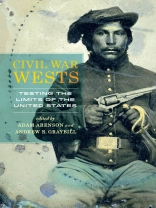This innovative study presents a new, integrated view of the Civil War and Reconstruction and the history of the western United States.
Award-winning historians such as Steven Hahn, Martha Sandweiss, William Deverell, Virginia Scharff, and Stephen Kantrowitz offer original essays on lives, choices, and legacies in the American West, discussing the consequences for American Indian nations, the link between Reconstruction and suffrage movements, and cross-border interactions with Canada and Mexico.
In the West, Civil War battlefields and Civil War politics engaged a wide range of ethnic and racial distinctions, raising questions that would arise only later in places farther east. Histories of Reconstruction in the South ignore the connections to previous occupation efforts and citizenship debates in the West. The stories contained in this volume complicate our understanding of the paths from slavery to freedom for white as well as non-white Americans.
By placing the histories of the American West and the Civil War and Reconstruction period within one sustained conversation, this volume expands the limits of both by emphasizing how struggles over land, labor, sovereignty, and citizenship shaped the U.S. nation-state in this tumultuous era. This volume highlights significant moments and common concerns of this continuous conflict, as it stretched across the continent and throughout the nineteenth century.
Publishing on the 150th anniversary of the end of the Civil War, this collection brings eminent historians into conversation, looking at the Civil War from several Western perspectives, and delivers a refreshingly disorienting view intended for scholars, general readers, and students.
Published in Cooperation with the William P. Clements Center for Southwest Studies, Southern Methodist University.
Spis treści
Introduction (Adam Arenson)
Part One: Borderlands in Conflict
1. Thwarting Southern Schemes and British Bluster in the Pacific Northwest (James Robbins Jewell)
2. Death in the Distance: Confederate Manifest Destiny and the Campaign for New Mexico, 1861–1862 (Megan Kate Nelson)
3. Kit Carson and the War for the Southwest: Separation and Survival along the Rio Grande, 1862–1868 (Lance R. Blyth)
4.Scattered People: The Long History of Forced Eviction in the Kansas-Missouri Borderlands (Diane Mutti Burke)
Part Two: The Civil War Is Not Over
5. 'The Future Empire of Our Freedmen’: Republican Colonization Schemes in Texas and Mexico, 1861-1865 (Nicholas Guyatt)
6. Three Faces of Sovereignty: Governing Confederate, Mexican, and Indian Texas in the Civil War Era (Gregory P. Downs)
7. Redemption Falls Short: Soldier and Surgeon in the Post–Civil War Far West (William Deverell)
8. Still Picture, Moving Stories: Reconstruction Comes to Indian Country (Martha A. Sandweiss)
Part Three: Borders of Citizenship
9. Race, Religion, and Naturalization: How the West Shaped Citizenship Debates in the Reconstruction Congress (Joshua Paddison)
10. Broadening the Battlefield: Conflict, Contingency, and the Mystery of Woman Suffrage in Wyoming, 1869 (Virginia Scharff)
11. 'Dis Land Which Jines Dat of Ole Master’s’: The Meaning of Citizenship for the Choctaw Freedpeople (Fay A. Yarbrough)
12. 'Citizen’s Clothing’: Reconstruction, Ho-Chunk Persistence, and the Politics of Dress (Stephen Kantrowitz)
Epilogue (Steven Hahn)
Acknowledgments
Bibliography
Index
O autorze
Adam Arenson is Associate Professor of History and Director of Urban Studies at Manhattan College, author of The Great Heart of the Republic: St. Louis and the Cultural Civil War (2011), and coeditor of Frontier Cities: Encounters at the Crossroads of Empire (2013).Andrew R. Graybill is Professor of History and Director of the William P. Clements Center for Southwest Studies at Southern Methodist University, author of Policing the Great Plains: Rangers, Mounties, and the North American Frontier, 1875–1910 (2007), and coeditor of Bridging National Borders in North America: Transnational and Comparative Histories (2010).












